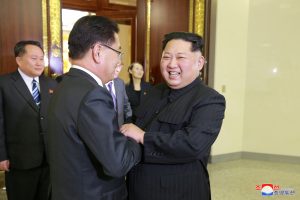
By Matt Spetalnick, David Brunnstrom and Phil Stewart
WASHINGTON (Reuters) – North Korea could buy time to build up and refine its nuclear arsenal, including a warhead able to survive re-entry into the Earth’s atmosphere, if it manages to drag out any talks with Washington, U.S. officials and experts say.
Even if North Korea freezes nuclear detonations and missile tests during such talks – as South Korea has said Pyongyang offered to do – there is plenty of other technical work it could pursue while diplomatic efforts are under way, they say.
Such work could include completing development of a re-entry vehicle that can deliver a nuclear weapon, production of rocket frames, engines and mobile launchers and increasing the output of plutonium and highly enriched uranium for bomb-making.
“North Korea can be expected to proceed on all these things … unless an agreement freezes or stops these activities, something unlikely in the short run,” said David Albright, a nuclear non-proliferation expert who heads Washington’s Institute for Science and International Security.
President Donald Trump has said Pyongyang seems “sincere” in its offer of talks, but some in Washington are wary that North Korean leader Kim Jong Un may be using it as a stalling tactic for further weapons development – especially of a nuclear-tipped missile capable of hitting the U.S. mainland – and to seek relief from tough international sanctions.
U.S. intelligence officials have said Kim is only months away from being able to mount such a strike, while some experts say he may already have the basic capability, even if it remains untested.
The Trump administration must weigh such risks, including North Korea’s history of reneging on commitments, in deciding whether to go to the negotiating table, U.S. officials said, speaking on condition of anonymity.
Proponents of engagement, including Joel Wit, a senior fellow at Washington’s U.S.-Korea Institute, said the fact that North Korea was unlikely to agree to a complete freeze of activity should not be an obstacle.
“These programs are going to continue, but if we have a suspension of nuclear tests and missile tests, that’s a good first step here. It’s better than not having one,” he said.
U.S. officials said Trump would be prepared to quickly pull the plug on diplomacy if it becomes obvious that Pyongyang is just trying to drag out talks.
One administration official said that while it was unclear how long Trump might keep the negotiating window open, it would likely be evident in months “if North Korea is just playing us.”
RE-ENTRY VEHICLE CHALLENGE
Either way, U.S. officials and experts agree there is value in getting North Korea to put its testing on hold as launches and detonations are vital to developing reliable weapons.
North Korea has tested dozens of missiles of various types in the past two years, including one launch of its largest-ever intercontinental ballistic missile, which is theoretically capable of hitting anywhere in the United States, on Nov. 29. There have since been no more tests.
South Korean envoys, who met Kim in Pyongyang this week and who are due in Washington to brief U.S. officials on Thursday, said he offered to suspend all nuclear and missile tests while conducting talks with the United States.
They said Kim also expressed a willingness to denuclearize, something he previously declared non-negotiable, if his country’s security was guaranteed.
U.S. and South Korean officials worry that North Korea will ultimately lay down impossible demands in talks – such as the complete withdrawal of U.S. forces from South Korea – and once diplomacy fails, emerge as an even greater threat than before.
Perhaps North Korea’s biggest challenge, experts say, is to show it can produce a re-entry vehicle robust enough to prevent a nuclear warhead burning up when it hurtles back into the Earth’s atmosphere.
Some of that work can be done on the ground, although a live test will eventually be needed as North Korea has never flown a missile at a trajectory that would simulate a long-range flight, experts say.
U.S. officials and experts believe North Korea also needs more time to create facilities capable of mass-producing missiles, engines and other components – a challenge to any country even without the constraints of stringent international sanctions.
To create a credible deterrent to the United States, North Korea would have to show it has the ability to launch multiple missiles at once to circumvent U.S. anti-missile defenses in the event of war.
It also needs additional transporter-erector launchers, or TELs, to enable it to fire missiles from hastily established positions less vulnerable to detection and attack than permanent launch sites.
At the same time, negotiations are unlikely to stop North Korea from continuing to seek materials and help from outside the country for its weapons programs.
“North Korea needs considerable outside help to outfit and sustain its missile and nuclear production,” Albright said. “Keeping the pressure up and implementing sanctions and export controls better is critical whatever happens.”
(Additional reporting by John Walcott; Editing by Mary Milliken and Peter Cooney)









